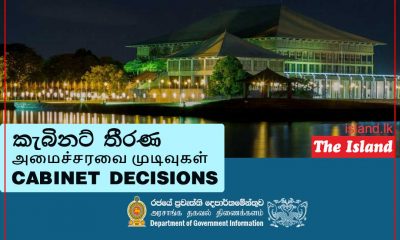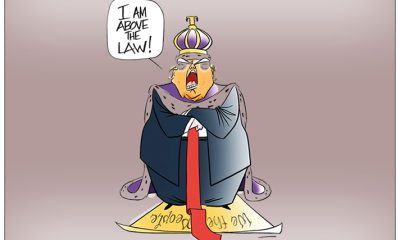Features
Trump Guilty! And Anniversary Blues

by Rajan Philips
Just after 5:00 PM local time on Thursday, a jury of 12 New Yorkers, seven men and five women, found the 45th President of the United States of America, Donald J. Trump, guilty on all 34 counts that he had been charged with for falsifying business records to influence the outcome of the 2016 presidential election. Each one of the 34 counts was about hiding the payment that Trump had authorized to be made to Stormy Daniels, a porn star and adult film actress, to buy her silence about a sexual liaison between them.
Neither the sex nor the silencing of it was illegal, but conspiring and acting to suppress the story from becoming public broke the New York State election law against hiding information from voters to influence an election. Hence the prosecution. And now the verdict.
The liaison had been in 2006 when Trump may not have even thought about running for president. The payment was made ten years later and one month before the November 2016 presidential election to stop the Stormy Daniel story reaching the media. The payment scheme was executed under a plan that Trump had put in place in August 2015, two months after he announced his presidential candidacy in New York.
The plan involved Michael Cohen, Trump’s nefarious personal lawyer taking care of under the table deals, and David Pecker, a tabloid magnate who provided “catch and kill” service to rich clients by buying out and not publishing scandalous stories about them. Pecker would be the “eyes and ears” of the Trump campaign and would look for negative stories from women and “take them off the market place.”
Pecker testified in court that he paid another of Trump’s liaison’s, one Karen McDougal, a former Playboy model, and bought her story, but was not reimbursed by Trump. For Stormy Daniel, the payment was made by Trump’s sidekick lawyer Michael Cohen and Cohen was reimbursed by Trump’s accountant in multiple payment and each payment was recorded as legal fees. Hence the falsification of records.
The jury heard all of this and more, including salacious details about Trump’s one night stand with Stormy, from 22 prosecution witnesses in the month long trial. Trump’s legal defence was largely limited to denouncing Michael Cohen as an inveterate liar and felon and asserting that his testimony should be rejected. The prosecution’s response was that they did not pick Cohen, but Trump did, and not only Cohen but also everyone else involved in this sordid tale.
New York Judge Juan Merchan who presided over the trial has set sentencing for July 11. That would be four days before the start of the Republican National Convention in Milwaukee, Wisconsin, where Trump is to be nominated as the Party’s presidential candidate. Although the charges that Trump has been found to be guilty of carry a maximum jail sentence of four years, the expectations in legal circles are that the Judge may settle for probation rather than imprisonment of a former President. In any event, Trump would certainly be appealing the verdict and the legal basis for his indictment and trial. He will keep grinding the American judicial wheel. And nothing will bar him being a presidential candidate.
Trump’s main defence is also political. He has already indicated that the real verdict would be delivered on November 5th, in the presidential election. He is going all out for victory, for he knows that is the only way he has to get out of his legal troubles. President Biden is in agreement with Trump that the real verdict would be on November 5th, because from his standpoint only the American people could ultimately decide to keep Trump out of the White House.
For now, the Republicans are rallying round Trump and denouncing the verdict from New York as a travesty of justice. The Democrats are celebrating the prevalence and the equal application of the rule of law even to a former President. How many Americans would want to have a convicted felon as their president? In most countries, he could not even be a candidate, and rightly so.
Anniversary Blues
In my column two weeks ago (May 19th), I made little more than passing references to two political anniversaries that come and go during the month of May. The older of the two is the anniversary of Sri Lanka becoming a republic and the First Republic Constitution that was adopted on May 22nd, 1972. The junior anniversary falls on May 19th and it marks the end of the war in 2009 – that came after nearly three decades of political violence and 37 years after Sri Lanka became a Republic. I also noted in passing that unlike the May 19th anniversary, no one observes the May 22nd anniversary officially or unofficially, and my comment itself may not have been noticed by anyone in particular.
So, it was fitting to see Dr. Nihal Jayawickrama’s fulsome reminder last week of the anniversary of the First Republic. I cannot agree more with his opinion that without Dr. Colvin R de Silva’s ministerial stewardship Sri Lanka would not have become a republic in the way and manner it did – as Dr. Colvin was wont to say, “not merely despite the Queen but in defiance of the Queen.” However, in my view, the reason why the republican anniversary has fallen into official disuse is because of the decision of the United Front Government after 1972 to officially celebrate only the Republic Day on May 22nd, and to stop commemorating the country’s independence day on February 4th, purportedly because it was a reminder of the UNP’s ‘fake independence’. That was unfortunate.
Ideally, the UF government could and should have celebrated both February 4th and May 22nd, and that would have established the same healthy tradition as in India where the independence day is celebrated on August 15th and the Republic Day on January 26th. Instead, the UF’s decision to ignore February 4th played straight into the tit-for-tat hands of JR Jayewardene. JRJ dropped all recognition of May 22nd and enshrined February 4th and other state paraphernalia such as the national flag and the national anthem in a Schedule to the 1978 Constitution and rendered them unalterable except through a referendum.
As well in my view, the very institution of the referendum was intended by JRJ to stop future negations of the state paraphernalia and to provide a mechanism for postponing elections. Judicial exuberance would later carry this further, interpretively. Imagine an underlying “basic structure” of the 1978 constitution (that was, in fact, no more than an offspring of the mind of President Jayewardene and the Parliamentary Committee that he presided over) and elevate the institution of the referendum as a requirement to amend any aspect of the basic structure. Dr. Jayawickrama, and Dr. Colvin R de Silva before him, have persuasively argued otherwise, and asserted that there is no need to use the referendum except for the specific purposes stipulated in the 1978 Constitution.
Additionally, I noted that the exceptionally flexible 1972 Constitution carried in its womb the seeds of its own undoing and was totally repudiated and wholly replaced by an exceptionally rigid constitution in 1978. Even though the anniversary of the 1972 Constitution may have fallen into disuse, the political legacy of 1972 has not died and continues to provide the parliamentary antithesis to the presidential usurpation of the 1978 constitution. Operationally, no political leader or party has been able to muster the same skill, strength and purpose of a Colvin R de Silva or a JR Jayewradene that is necessary to constitutionally resolve this political tension. But the tension is there, and it commemorates 1972.
If May 22nd is a formally forgotten anniversary, May 19th is a much remembered one. The end of the war anniversary is remembered officially and unofficially, in the north and in the south, and in places east and west where many Sri Lankans have now migrated. As I noted earlier, the end of the war anniversaries have become the continuation of the war by peaceful means. And I expressed the hope that they would remain peaceful forever and are not influenced or infected by the raw shenanigans such as allegedly involving the current Indian government and Khalistan Sikhs.
This year there has been more than the usual spate of commentaries on the end of the war commemorations. Of all the writeups, I was most struck by Meera Srinivasan’s account in The Hindu, dated May 25th, and entitled “A Poverty of Hope Among Sri Lankan Tamils.” Ms. Srinivasan’s columns are available on line and are often republished in Colombo. She is a well informed and objective writer, but what sets this particular piece apart from her other writings and the writings of others on the end of the war anniversary is, in my view, the exclusive focus on people – the survivors and victims of war. Many of them are double victims of the 2004 tsunami and the 2009 devastation.
The people and their plights are always forgotten in the misallocation of resources, haggling over devolution of powers and debates over political abstractions. Even the ever elusive reconciliation attempts are all top-down and far removed from the needs of the people. Addressing the basic needs of the people on the ground is the most basic obligation of the state and those who aspire to be its leaders.
It should not be difficult for the Sri Lankan state to return to people their land to rebuild their lives, give fishers free access to the sea and the means to transport their haul, provide basic water and sanitary services, establish schools for children, and most of all provide conclusive information on people who have gone missing after surrendering. Who will commit to making a start on this basic agenda before the next anniversary? That could be a question for the upcoming presidential election.
Features
The heart-friendly health minister

by Dr Gotabhya Ranasinghe
Senior Consultant Cardiologist
National Hospital Sri Lanka
When we sought a meeting with Hon Dr. Ramesh Pathirana, Minister of Health, he graciously cleared his busy schedule to accommodate us. Renowned for his attentive listening and deep understanding, Minister Pathirana is dedicated to advancing the health sector. His openness and transparency exemplify the qualities of an exemplary politician and minister.
Dr. Palitha Mahipala, the current Health Secretary, demonstrates both commendable enthusiasm and unwavering support. This combination of attributes makes him a highly compatible colleague for the esteemed Minister of Health.
Our discussion centered on a project that has been in the works for the past 30 years, one that no other minister had managed to advance.
Minister Pathirana, however, recognized the project’s significance and its potential to revolutionize care for heart patients.
The project involves the construction of a state-of-the-art facility at the premises of the National Hospital Colombo. The project’s location within the premises of the National Hospital underscores its importance and relevance to the healthcare infrastructure of the nation.
This facility will include a cardiology building and a tertiary care center, equipped with the latest technology to handle and treat all types of heart-related conditions and surgeries.
Securing funding was a major milestone for this initiative. Minister Pathirana successfully obtained approval for a $40 billion loan from the Asian Development Bank. With the funding in place, the foundation stone is scheduled to be laid in September this year, and construction will begin in January 2025.
This project guarantees a consistent and uninterrupted supply of stents and related medications for heart patients. As a result, patients will have timely access to essential medical supplies during their treatment and recovery. By securing these critical resources, the project aims to enhance patient outcomes, minimize treatment delays, and maintain the highest standards of cardiac care.
Upon its fruition, this monumental building will serve as a beacon of hope and healing, symbolizing the unwavering dedication to improving patient outcomes and fostering a healthier society.We anticipate a future marked by significant progress and positive outcomes in Sri Lanka’s cardiovascular treatment landscape within the foreseeable timeframe.
Features
A LOVING TRIBUTE TO JESUIT FR. ALOYSIUS PIERIS ON HIS 90th BIRTHDAY

by Fr. Emmanuel Fernando, OMI
Jesuit Fr. Aloysius Pieris (affectionately called Fr. Aloy) celebrated his 90th birthday on April 9, 2024 and I, as the editor of our Oblate Journal, THE MISSIONARY OBLATE had gone to press by that time. Immediately I decided to publish an article, appreciating the untiring selfless services he continues to offer for inter-Faith dialogue, the renewal of the Catholic Church, his concern for the poor and the suffering Sri Lankan masses and to me, the present writer.
It was in 1988, when I was appointed Director of the Oblate Scholastics at Ampitiya by the then Oblate Provincial Fr. Anselm Silva, that I came to know Fr. Aloy more closely. Knowing well his expertise in matters spiritual, theological, Indological and pastoral, and with the collaborative spirit of my companion-formators, our Oblate Scholastics were sent to Tulana, the Research and Encounter Centre, Kelaniya, of which he is the Founder-Director, for ‘exposure-programmes’ on matters spiritual, biblical, theological and pastoral. Some of these dimensions according to my view and that of my companion-formators, were not available at the National Seminary, Ampitiya.
Ever since that time, our Oblate formators/ accompaniers at the Oblate Scholasticate, Ampitiya , have continued to send our Oblate Scholastics to Tulana Centre for deepening their insights and convictions regarding matters needed to serve the people in today’s context. Fr. Aloy also had tried very enthusiastically with the Oblate team headed by Frs. Oswald Firth and Clement Waidyasekara to begin a Theologate, directed by the Religious Congregations in Sri Lanka, for the contextual formation/ accompaniment of their members. It should very well be a desired goal of the Leaders / Provincials of the Religious Congregations.
Besides being a formator/accompanier at the Oblate Scholasticate, I was entrusted also with the task of editing and publishing our Oblate journal, ‘The Missionary Oblate’. To maintain the quality of the journal I continue to depend on Fr. Aloy for his thought-provoking and stimulating articles on Biblical Spirituality, Biblical Theology and Ecclesiology. I am very grateful to him for his generous assistance. Of late, his writings on renewal of the Church, initiated by Pope St. John XX111 and continued by Pope Francis through the Synodal path, published in our Oblate journal, enable our readers to focus their attention also on the needed renewal in the Catholic Church in Sri Lanka. Fr. Aloy appreciated very much the Synodal path adopted by the Jesuit Pope Francis for the renewal of the Church, rooted very much on prayerful discernment. In my Religious and presbyteral life, Fr.Aloy continues to be my spiritual animator / guide and ongoing formator / acccompanier.
Fr. Aloysius Pieris, BA Hons (Lond), LPh (SHC, India), STL (PFT, Naples), PhD (SLU/VC), ThD (Tilburg), D.Ltt (KU), has been one of the eminent Asian theologians well recognized internationally and one who has lectured and held visiting chairs in many universities both in the West and in the East. Many members of Religious Congregations from Asian countries have benefited from his lectures and guidance in the East Asian Pastoral Institute (EAPI) in Manila, Philippines. He had been a Theologian consulted by the Federation of Asian Bishops’ Conferences for many years. During his professorship at the Gregorian University in Rome, he was called to be a member of a special group of advisers on other religions consulted by Pope Paul VI.
Fr. Aloy is the author of more than 30 books and well over 500 Research Papers. Some of his books and articles have been translated and published in several countries. Among those books, one can find the following: 1) The Genesis of an Asian Theology of Liberation (An Autobiographical Excursus on the Art of Theologising in Asia, 2) An Asian Theology of Liberation, 3) Providential Timeliness of Vatican 11 (a long-overdue halt to a scandalous millennium, 4) Give Vatican 11 a chance, 5) Leadership in the Church, 6) Relishing our faith in working for justice (Themes for study and discussion), 7) A Message meant mainly, not exclusively for Jesuits (Background information necessary for helping Francis renew the Church), 8) Lent in Lanka (Reflections and Resolutions, 9) Love meets wisdom (A Christian Experience of Buddhism, 10) Fire and Water 11) God’s Reign for God’s poor, 12) Our Unhiddden Agenda (How we Jesuits work, pray and form our men). He is also the Editor of two journals, Vagdevi, Journal of Religious Reflection and Dialogue, New Series.
Fr. Aloy has a BA in Pali and Sanskrit from the University of London and a Ph.D in Buddhist Philosophy from the University of Sri Lankan, Vidyodaya Campus. On Nov. 23, 2019, he was awarded the prestigious honorary Doctorate of Literature (D.Litt) by the Chancellor of the University of Kelaniya, the Most Venerable Welamitiyawe Dharmakirthi Sri Kusala Dhamma Thera.
Fr. Aloy continues to be a promoter of Gospel values and virtues. Justice as a constitutive dimension of love and social concern for the downtrodden masses are very much noted in his life and work. He had very much appreciated the commitment of the late Fr. Joseph (Joe) Fernando, the National Director of the Social and Economic Centre (SEDEC) for the poor.
In Sri Lanka, a few religious Congregations – the Good Shepherd Sisters, the Christian Brothers, the Marist Brothers and the Oblates – have invited him to animate their members especially during their Provincial Congresses, Chapters and International Conferences. The mainline Christian Churches also have sought his advice and followed his seminars. I, for one, regret very much, that the Sri Lankan authorities of the Catholic Church –today’s Hierarchy—- have not sought Fr.
Aloy’s expertise for the renewal of the Catholic Church in Sri Lanka and thus have not benefited from the immense store of wisdom and insight that he can offer to our local Church while the Sri Lankan bishops who governed the Catholic church in the immediate aftermath of the Second Vatican Council (Edmund Fernando OMI, Anthony de Saram, Leo Nanayakkara OSB, Frank Marcus Fernando, Paul Perera,) visited him and consulted him on many matters. Among the Tamil Bishops, Bishop Rayappu Joseph was keeping close contact with him and Bishop J. Deogupillai hosted him and his team visiting him after the horrible Black July massacre of Tamils.
Features
A fairy tale, success or debacle

Sri Lanka-Singapore Free Trade Agreement
By Gomi Senadhira
senadhiragomi@gmail.com
“You might tell fairy tales, but the progress of a country cannot be achieved through such narratives. A country cannot be developed by making false promises. The country moved backward because of the electoral promises made by political parties throughout time. We have witnessed that the ultimate result of this is the country becoming bankrupt. Unfortunately, many segments of the population have not come to realize this yet.” – President Ranil Wickremesinghe, 2024 Budget speech
Any Sri Lankan would agree with the above words of President Wickremesinghe on the false promises our politicians and officials make and the fairy tales they narrate which bankrupted this country. So, to understand this, let’s look at one such fairy tale with lots of false promises; Ranil Wickremesinghe’s greatest achievement in the area of international trade and investment promotion during the Yahapalana period, Sri Lanka-Singapore Free Trade Agreement (SLSFTA).
It is appropriate and timely to do it now as Finance Minister Wickremesinghe has just presented to parliament a bill on the National Policy on Economic Transformation which includes the establishment of an Office for International Trade and the Sri Lanka Institute of Economics and International Trade.
Was SLSFTA a “Cleverly negotiated Free Trade Agreement” as stated by the (former) Minister of Development Strategies and International Trade Malik Samarawickrama during the Parliamentary Debate on the SLSFTA in July 2018, or a colossal blunder covered up with lies, false promises, and fairy tales? After SLSFTA was signed there were a number of fairy tales published on this agreement by the Ministry of Development Strategies and International, Institute of Policy Studies, and others.
However, for this article, I would like to limit my comments to the speech by Minister Samarawickrama during the Parliamentary Debate, and the two most important areas in the agreement which were covered up with lies, fairy tales, and false promises, namely: revenue loss for Sri Lanka and Investment from Singapore. On the other important area, “Waste products dumping” I do not want to comment here as I have written extensively on the issue.
1. The revenue loss
During the Parliamentary Debate in July 2018, Minister Samarawickrama stated “…. let me reiterate that this FTA with Singapore has been very cleverly negotiated by us…. The liberalisation programme under this FTA has been carefully designed to have the least impact on domestic industry and revenue collection. We have included all revenue sensitive items in the negative list of items which will not be subject to removal of tariff. Therefore, 97.8% revenue from Customs duty is protected. Our tariff liberalisation will take place over a period of 12-15 years! In fact, the revenue earned through tariffs on goods imported from Singapore last year was Rs. 35 billion.
The revenue loss for over the next 15 years due to the FTA is only Rs. 733 million– which when annualised, on average, is just Rs. 51 million. That is just 0.14% per year! So anyone who claims the Singapore FTA causes revenue loss to the Government cannot do basic arithmetic! Mr. Speaker, in conclusion, I call on my fellow members of this House – don’t mislead the public with baseless criticism that is not grounded in facts. Don’t look at petty politics and use these issues for your own political survival.”
I was surprised to read the minister’s speech because an article published in January 2018 in “The Straits Times“, based on information released by the Singaporean Negotiators stated, “…. With the FTA, tariff savings for Singapore exports are estimated to hit $10 million annually“.
As the annual tariff savings (that is the revenue loss for Sri Lanka) calculated by the Singaporean Negotiators, Singaporean $ 10 million (Sri Lankan rupees 1,200 million in 2018) was way above the rupees’ 733 million revenue loss for 15 years estimated by the Sri Lankan negotiators, it was clear to any observer that one of the parties to the agreement had not done the basic arithmetic!
Six years later, according to a report published by “The Morning” newspaper, speaking at the Committee on Public Finance (COPF) on 7th May 2024, Mr Samarawickrama’s chief trade negotiator K.J. Weerasinghehad had admitted “…. that forecasted revenue loss for the Government of Sri Lanka through the Singapore FTA is Rs. 450 million in 2023 and Rs. 1.3 billion in 2024.”
If these numbers are correct, as tariff liberalisation under the SLSFTA has just started, we will pass Rs 2 billion very soon. Then, the question is how Sri Lanka’s trade negotiators made such a colossal blunder. Didn’t they do their basic arithmetic? If they didn’t know how to do basic arithmetic they should have at least done their basic readings. For example, the headline of the article published in The Straits Times in January 2018 was “Singapore, Sri Lanka sign FTA, annual savings of $10m expected”.
Anyway, as Sri Lanka’s chief negotiator reiterated at the COPF meeting that “…. since 99% of the tariffs in Singapore have zero rates of duty, Sri Lanka has agreed on 80% tariff liberalisation over a period of 15 years while expecting Singapore investments to address the imbalance in trade,” let’s turn towards investment.
Investment from Singapore
In July 2018, speaking during the Parliamentary Debate on the FTA this is what Minister Malik Samarawickrama stated on investment from Singapore, “Already, thanks to this FTA, in just the past two-and-a-half months since the agreement came into effect we have received a proposal from Singapore for investment amounting to $ 14.8 billion in an oil refinery for export of petroleum products. In addition, we have proposals for a steel manufacturing plant for exports ($ 1 billion investment), flour milling plant ($ 50 million), sugar refinery ($ 200 million). This adds up to more than $ 16.05 billion in the pipeline on these projects alone.
And all of these projects will create thousands of more jobs for our people. In principle approval has already been granted by the BOI and the investors are awaiting the release of land the environmental approvals to commence the project.
I request the Opposition and those with vested interests to change their narrow-minded thinking and join us to develop our country. We must always look at what is best for the whole community, not just the few who may oppose. We owe it to our people to courageously take decisions that will change their lives for the better.”
According to the media report I quoted earlier, speaking at the Committee on Public Finance (COPF) Chief Negotiator Weerasinghe has admitted that Sri Lanka was not happy with overall Singapore investments that have come in the past few years in return for the trade liberalisation under the Singapore-Sri Lanka Free Trade Agreement. He has added that between 2021 and 2023 the total investment from Singapore had been around $162 million!
What happened to those projects worth $16 billion negotiated, thanks to the SLSFTA, in just the two-and-a-half months after the agreement came into effect and approved by the BOI? I do not know about the steel manufacturing plant for exports ($ 1 billion investment), flour milling plant ($ 50 million) and sugar refinery ($ 200 million).
However, story of the multibillion-dollar investment in the Petroleum Refinery unfolded in a manner that would qualify it as the best fairy tale with false promises presented by our politicians and the officials, prior to 2019 elections.
Though many Sri Lankans got to know, through the media which repeatedly highlighted a plethora of issues surrounding the project and the questionable credentials of the Singaporean investor, the construction work on the Mirrijiwela Oil Refinery along with the cement factory began on the24th of March 2019 with a bang and Minister Ranil Wickremesinghe and his ministers along with the foreign and local dignitaries laid the foundation stones.
That was few months before the 2019 Presidential elections. Inaugurating the construction work Prime Minister Ranil Wickremesinghe said the projects will create thousands of job opportunities in the area and surrounding districts.
The oil refinery, which was to be built over 200 acres of land, with the capacity to refine 200,000 barrels of crude oil per day, was to generate US$7 billion of exports and create 1,500 direct and 3,000 indirect jobs. The construction of the refinery was to be completed in 44 months. Four years later, in August 2023 the Cabinet of Ministers approved the proposal presented by President Ranil Wickremesinghe to cancel the agreement with the investors of the refinery as the project has not been implemented! Can they explain to the country how much money was wasted to produce that fairy tale?
It is obvious that the President, ministers, and officials had made huge blunders and had deliberately misled the public and the parliament on the revenue loss and potential investment from SLSFTA with fairy tales and false promises.
As the president himself said, a country cannot be developed by making false promises or with fairy tales and these false promises and fairy tales had bankrupted the country. “Unfortunately, many segments of the population have not come to realize this yet”.
(The writer, a specialist and an activist on trade and development issues . )
























